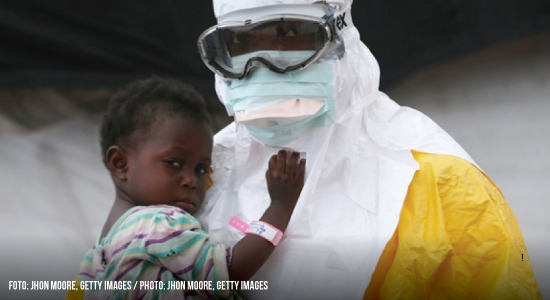
Ebola: new outbreaks increase risk of spread of the virus
WHO warns of threats to humanitarian response to the Congo Ebola epidemic
09/10/2018
In the DRC, in fear, some people are fleeing into the forest to avoid follow-up therapies and Ebola tests
The new focuses of Ebola in the Democratic Republic of Congo (DRC) threaten the progress combating the disease and increase the risk of spread, warned the World Health Organization (WHO) on September 21. To the moment, the northeast of the country accounts for 142 cases and 97 deaths. Significant risks for the spread of the disease remain, said WHO spokeswoman, Fadela Chaib in Geneva. Still according to her, ongoing challenges include delayed virus detection at precarious centers for health, prevention and control of infections, and reluctance of some people to be treated at treatment centers.
In addition, the WHO has warned of the threat to the humanitarian response to the epidemic in the DRC due to the clashes. Their activities in Beni have been suspended. We are afraid that several factors can add up in the next weeks and months to create the perfect potential storm, said the head of the WHO Emergency Response, Peter Salama, in Geneva. He also stated the concern for the safety of the team due to the exploitation of the epidemic by candidates in Decembers elections. Some people are fleeing to the forest in order to avoid follow-up therapies and Ebola tests, sometimes getting away for hundreds of kilometers.
We are at a crucial point of the epidemic, said Berangère Guais, emergency coordinator of the Médecins Sans Frontières (MSF), in Beni, North Kivu. She pointed out that, despite having decreased significantly, new cases caused by different strains of the virus have emerged in the recent days. According to her, it is necessary to keep working in the community to build trust and ensure that everyone who presents the symptoms of Ebola are isolated and tested quickly. We cant let our guard down until the end of the epidemic is declared, she added. Currently, the MSF has four treatment centers, located in the cities of Makeke, Butembo, Beni and Mangina, the epicenter of the outbreak.
Makeke a temporary screening center with seven beds was built on the border of North Kivu with Ituri, on August 28, as a result of the number of cases in the region and the community’s resistance to be treated in Mangina, while another organization built a treatment center. This way, suspected patients can be isolated and tested for Ebola closer to their homes and will only be transferred for treatment centers if the test is positive. In North Kivu, where the epidemic was declared on August 1 and one of the most unstable areas in the region due to conflicts, the MSF reported that, even with the local tension, the outbreaks combat treatment, bringing medical assistance to patients as well as drugs and prophylaxis to local health professionals.
The MSF has stressed that at the moment they have focused in the treatment of the infected patients, in rapidity diagnosing and containing transmission as fast as possible to avoid the return of the disease. To them, the experience gained in previous epidemics has helped a more efficient reaction in recent episodes. In addition, they are vaccinating by the method known as ring (immunization of relatives of sick people and their contacts). Finally, the humanitarian organization says they are worried about their health professionals, which are being vaccinated. Unfortunately, in this epidemic, we have seen at least 17 health professionals infected by the Ebola, complained Berangère Guais.
The Ebola virus is endemic in the vast Central African country, which has accounted 10 outbreaks in the last four decades. The overcoming of this last outbreak in the region of North Kivu is proving complicated due to mass displacements linked to dozens of armed groups and other threats to health, including polio and cholera. The clashes have forced the shutdown of some services offered by sanitary authorities, as well as by some humanitarian agencies, such as the Norwegian Council for Refugees. We have not identified the need to evacuate, but a variety of contingency plans are under development to decide where are agents are better located, said Peter Salama.
…










